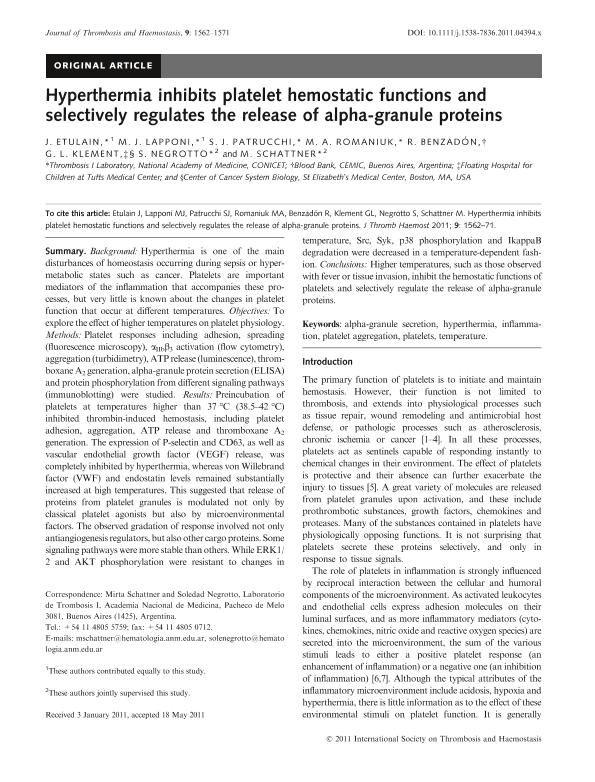Artículo
Hyperthermia inhibits platelet hemostatic functions and selectively regulates the release of alpha-granule proteins
Etulain, Julia ; Lapponi, María José
; Lapponi, María José ; Patrucchi, S.J.; Romaniuk, María Albertina
; Patrucchi, S.J.; Romaniuk, María Albertina ; Benzadón, R.; Klement, G. L.; Negrotto, Soledad
; Benzadón, R.; Klement, G. L.; Negrotto, Soledad ; Schattner, Mirta Ana
; Schattner, Mirta Ana
 ; Lapponi, María José
; Lapponi, María José ; Patrucchi, S.J.; Romaniuk, María Albertina
; Patrucchi, S.J.; Romaniuk, María Albertina ; Benzadón, R.; Klement, G. L.; Negrotto, Soledad
; Benzadón, R.; Klement, G. L.; Negrotto, Soledad ; Schattner, Mirta Ana
; Schattner, Mirta Ana
Fecha de publicación:
08/2011
Editorial:
Wiley Blackwell Publishing, Inc
Revista:
Journal of Thrombosis and Haemostasis
ISSN:
1538-7933
Idioma:
Inglés
Tipo de recurso:
Artículo publicado
Clasificación temática:
Resumen
Background: Hyperthermia is one of the main disturbances of homeostasis occurring during sepsis or hypermetabolic states such as cancer. Platelets are important mediators of the inflammation that accompanies these processes, but very little is known about the changes in platelet function that occur at different temperatures. Objectives: To explore the effect of higher temperatures on platelet physiology. Methods: Platelet responses including adhesion, spreading (fluorescence microscopy), α IIbβ 3 activation (flow cytometry), aggregation (turbidimetry), ATP release (luminescence), thromboxane A 2 generation, alpha-granule protein secretion (ELISA) and protein phosphorylation from different signaling pathways (immunoblotting) were studied. Results: Preincubation of platelets at temperatures higher than 37°C (38.5-42°C) inhibited thrombin-induced hemostasis, including platelet adhesion, aggregation, ATP release and thromboxane A 2 generation. The expression of P-selectin and CD63, as well as vascular endothelial growth factor (VEGF) release, was completely inhibited by hyperthermia, whereas von Willebrand factor (VWF) and endostatin levels remained substantially increased at high temperatures. This suggested that release of proteins from platelet granules is modulated not only by classical platelet agonists but also by microenvironmental factors. The observed gradation of response involved not only antiangiogenesis regulators, but also other cargo proteins. Some signaling pathways were more stable than others. While ERK1/2 and AKT phosphorylation were resistant to changes in temperature, Src, Syk, p38 phosphorylation and IkappaB degradation were decreased in a temperature-dependent fashion. Conclusions: Higher temperatures, such as those observed with fever or tissue invasion, inhibit the hemostatic functions of platelets and selectively regulate the release of alpha-granule proteins. © 2011 International Society on Thrombosis and Haemostasis.
Archivos asociados
Licencia
Identificadores
Colecciones
Articulos(IMEX)
Articulos de INST.DE MEDICINA EXPERIMENTAL
Articulos de INST.DE MEDICINA EXPERIMENTAL
Citación
Etulain, Julia; Lapponi, María José; Patrucchi, S.J.; Romaniuk, María Albertina; Benzadón, R.; et al.; Hyperthermia inhibits platelet hemostatic functions and selectively regulates the release of alpha-granule proteins; Wiley Blackwell Publishing, Inc; Journal of Thrombosis and Haemostasis; 9; 8; 8-2011; 1562-1571
Compartir
Altmétricas



